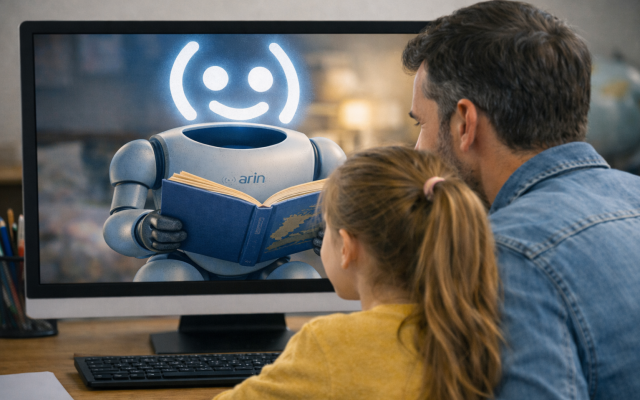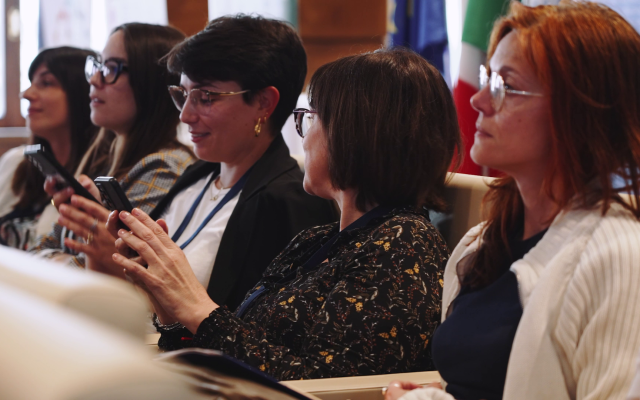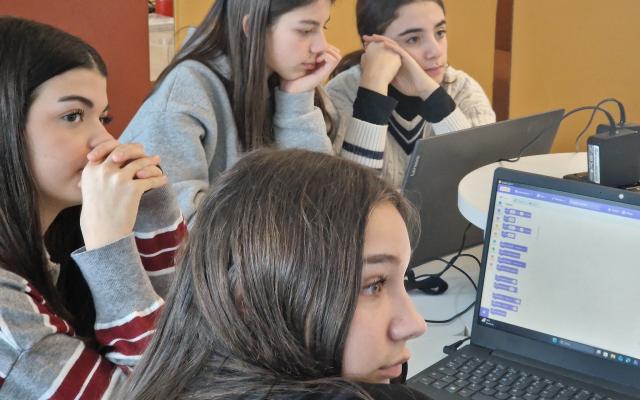Towards RomeCup 2025: an interview with Silvia Colombo from ING Italy
How can we prepare the younger generations to face the risks and opportunities of digital transformation? At the RomeCup 2025, ING Italy is bringing the topic of cybersecurity to the forefront of the event, involving students in an immersive experience of ethical hacking. This is an opportunity to reflect on the importance of digital and soft skills for navigating the online world safely and consciously. We talked about it with Silvia Colombo, Head of Communication & CSR at ING Italy, who told us about the bank's commitment to promoting a digitally inclusive economy through the Job Digital Lab project.
At RomeCup 2025, cybersecurity is the focus of an event dedicated to upper secondary school students, thanks to the participation of ING Italy, a long-standing partner of the Fondazione Mondo Digitale. The topic is one of the cornerstones of the Job Digital Lab project, which aims to help young people and adults develop digital and transferable skills for the workplace.
The event offers a challenging learning experience that combines learning, inspiration and competition. Participants are involved in an ethical hacking activity led by industry experts, with practical demonstrations and case study analyses. The aim is to raise young people's awareness of cybersecurity issues and to promote a new generation of digital professionals who are aware and well-prepared, and able to face the challenges of the online and offline world with competence and confidence.
Silvia Colombo, Head of Communication & CSR at ING Italy, commented on their participation in RomeCup: ‘The topic of artificial intelligence will become central to all of our daily lives. It will therefore become increasingly important to consider the various advantages and disadvantages at an ethical and social level: from the consequences on the world of work, education and social inclusion, but also in terms of data protection and cybersecurity. ING was founded as a pioneering digital bank, and by its very nature is always attentive to technological evolution. This translates into an amplified sense of responsibility when it comes to digitalisation, both towards our customers and towards civil society. In this sense, ING Italia's collaboration with Fondazione Mondo Digitale through its support for RomeCup 2025 represents the realisation of this responsibility’.
The initiative is part of the broader Job Digital Lab programme, which in its fifth edition confirms a specific focus on digital security and the development of strategic skills for the professional future of the younger generations.
‘Future-proof skills’ is the strong idea behind our joint commitment to the Job Digital Lab project. In your opinion, what role should an organisation like yours play in a cross-sector alliance to promote digital skills, especially among young people?
The effects of the digital transformation are there for all to see: new professions are emerging, evolving or disappearing, services are being digitised with a consequent loss of competitiveness for companies that don't know how to seize new opportunities, there is a need to update and develop new skills in a rapidly changing world where keeping up with the times is increasingly complex.
The younger generation, on the other hand, needs to be guided and helped to choose the professions of the future: they certainly have an advantage when it comes to digital skills, but they don't necessarily know how to turn their sometimes innate skills into an effective and valuable career path.
As a pioneering digital bank, we can play an important role in contributing positively to this evolution and we want to do so through a concrete path of skills development, training, upskilling and reskilling designed for students, professionals, and people looking for new opportunities, acting in a systemic way with the ultimate goal of promoting a digitally inclusive economy. This is how Job Digital Lab was born, with Fondazione Mondo Digitale, representing ING's concrete commitment to supporting professionals, but also and above all the new generations in the development of digital and soft skills for work, helping them to feel more confident in their abilities and more secure in actively participating in the economy.
Knowing how to channel your energy and organise your knowledge, and how to work together, are skills without which it is very difficult to realise your projects, both at work and in your private life. How important is it, as Job Digital Lab is often committed to doing, to train soft skills for the future, and in particular those profoundly human abilities without which no technical competence can really be translated into constructive actions?
The more intelligent technology becomes, the more human we must become. We still can't quantify the maximum limit to which AI can develop its computing capabilities, but we don't even know what human potential really is. The focus, therefore, is on developing and solidifying all those skills that we today call ‘soft,’ but which constitute the crucial difference between man and machine.
Emotional intelligence, critical thinking, but also knowing how to get along with others, being curious and following one's instincts are skills that a machine or an algorithm will never be able to replicate. So, if artificial intelligence can assist us in an excellent way from a technical point of view, it is only by fully exploiting the human factor that we can make a difference.
At RomeCup2025, with Job Digital Lab we're helping young people discover the crucial role of cybersecurity, with the help of experts and young ethical hackers. Why do young people also need to become more aware of the risks of the internet?
The data speaks for itself. We saw it in the research we conducted on this very topic together with YouGov, but also in the studies by Clusit and the surveys by the Postal Police: cyber fraud affects everyone, regardless of age, gender, profession and level of education. The issue of digital and online security is therefore a cross-cutting one.
However, the focus on the younger generations is necessary due to their connection with technology, which is a much more visceral part of their lives than it is for the average adult. They spend more time with it and inevitably they are also much more familiar with it. But this very fact makes them more vulnerable victims and potentially easier to attack. For this reason, ING prioritises action on the issue of cybersecurity, educating young people on practices that will help them identify, prevent and protect themselves from the dangers of the digital world.
As part of our mutual collaboration, we have often focused on a critical, conscious and inclusive use of AI, as promoted by the Manifesto for Collective Action. How do you address the new challenges that are crucial for humanity?
Our approach to artificial intelligence is centred on knowledge, on deepening our understanding of the phenomenon so that we can make the most of the opportunities it offers, while at the same time paying due attention to the potential risks, in order to control and prevent them. By its very nature, the concept of risk is a constant in the banking sector: the sensitivity and consequent heavy regulation of banking activities require a detailed screening of all innovations that are introduced, to protect our customers and society in general. This does not take away the bank's ability to use artificial intelligence in a constructive way. In fact, there are numerous applications in this sense that can facilitate interaction with the customer, for example, or automate routine services, to dedicate more energy to value-added services. It remains essential to include the use of these tools in a context of awareness, making sure to enhance their potential and mitigate their risks.

By Onelia Onorati, who is in charge of the press office for the Fondazione Mondo Digitale.




